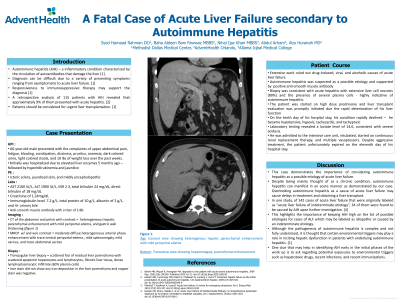Back


Poster Session C - Monday Afternoon
Category: Liver
C0613 - A Fatal Case of Acute Liver Failure Secondary to Autoimmune Hepatitis
Monday, October 24, 2022
3:00 PM – 5:00 PM ET
Location: Crown Ballroom

Has Audio

Syed Hamaad Rahman, DO
Methodist Dallas Medical Center
Dallas, TX
Presenting Author(s)
Syed Hamaad Rahman, DO1, Baha Aldeen Bani Fawwaz, MBBS2, Nihal Ijaz Khan, MBBS3, Abdul Arham, MBBS4, Abu Hurairah, MD2
1Methodist Dallas Medical Center, Dallas, TX; 2AdventHealth Orlando, Orlando, FL; 3Allama Iqbal Medical College, Sarnia, ON, Canada; 4Allama Iqbal Medical College, Mississauga, ON, Canada
Introduction: Autoimmune hepatitis (AIH) refers to an inflammatory liver condition characterized by the circulation of autoantibodies that cause damage to the liver. AIH can present in a number of ways, varying from completely asymptomatic to severe hepatic dysfunction, making it a disease which is difficult to diagnose. Although autoimmune hepatitis is a common cause of chronic liver disease, in some rare cases it can also be the cause of acute liver failure (ALF).
Case Description/Methods: A 66-year-old male with no history of liver disease presented for progressively rising liver enzymes, jaundice, and hyperbilirubinemia. Upon arrival he complained of upper abdominal pain, fatigue, bloating, constipation, dizziness, pruritus, and loss of appetite. He noted dark colored urine, light colored stools, and 10 lbs of weight loss over the past weeks. Physical examination demonstrated icteric sclera, jaundiced skin, and mild encephalopathy. After ruling out drug-induced, viral, and alcoholic causes of acute liver failure, autoimmune hepatitis was suspected as a possible etiology. Testing revealed that the patient was positive for anti-smooth muscle antibody with a titer of 1:80. A transjugular liver biopsy with histopathological analysis revealed acute hepatitis with extensive liver cell necrosis (80%) and several plasma cells, highly indicative of autoimmune hepatitis. He was started on high dose prednisone and transplant evaluation was promptly initiated due the rapid deterioration of his liver function. On the 10th day of the patient’s hospital stay, his condition rapidly declined when he became hypotensive, hypoxic, tachycardic, and tachypneic. Laboratory results at that time were consistent with severe acidosis. He was admitted to the intensive care unit where he was intubated, started on continuous renal replacement therapy and multiple vasopressors. Despite aggressive treatment, the patient expired on the 11th day of hospitalization.
Discussion: Despite being mainly thought of as a chronic condition, AIH can manifest acutely as demonstrated by our case. In one study, of 142 cases of acute liver failure that were originally labeled as “acute liver failure of indeterminate etiology”, 34 of them were found to be caused by AIH upon further investigation. This case demonstrates the importance of considering autoimmune hepatitis as a possible etiology of acute liver failure. Overlooking autoimmune hepatitis as a cause of acute liver failure may cause delays in treatment and obtaining a liver transplant.
Disclosures:
Syed Hamaad Rahman, DO1, Baha Aldeen Bani Fawwaz, MBBS2, Nihal Ijaz Khan, MBBS3, Abdul Arham, MBBS4, Abu Hurairah, MD2. C0613 - A Fatal Case of Acute Liver Failure Secondary to Autoimmune Hepatitis, ACG 2022 Annual Scientific Meeting Abstracts. Charlotte, NC: American College of Gastroenterology.
1Methodist Dallas Medical Center, Dallas, TX; 2AdventHealth Orlando, Orlando, FL; 3Allama Iqbal Medical College, Sarnia, ON, Canada; 4Allama Iqbal Medical College, Mississauga, ON, Canada
Introduction: Autoimmune hepatitis (AIH) refers to an inflammatory liver condition characterized by the circulation of autoantibodies that cause damage to the liver. AIH can present in a number of ways, varying from completely asymptomatic to severe hepatic dysfunction, making it a disease which is difficult to diagnose. Although autoimmune hepatitis is a common cause of chronic liver disease, in some rare cases it can also be the cause of acute liver failure (ALF).
Case Description/Methods: A 66-year-old male with no history of liver disease presented for progressively rising liver enzymes, jaundice, and hyperbilirubinemia. Upon arrival he complained of upper abdominal pain, fatigue, bloating, constipation, dizziness, pruritus, and loss of appetite. He noted dark colored urine, light colored stools, and 10 lbs of weight loss over the past weeks. Physical examination demonstrated icteric sclera, jaundiced skin, and mild encephalopathy. After ruling out drug-induced, viral, and alcoholic causes of acute liver failure, autoimmune hepatitis was suspected as a possible etiology. Testing revealed that the patient was positive for anti-smooth muscle antibody with a titer of 1:80. A transjugular liver biopsy with histopathological analysis revealed acute hepatitis with extensive liver cell necrosis (80%) and several plasma cells, highly indicative of autoimmune hepatitis. He was started on high dose prednisone and transplant evaluation was promptly initiated due the rapid deterioration of his liver function. On the 10th day of the patient’s hospital stay, his condition rapidly declined when he became hypotensive, hypoxic, tachycardic, and tachypneic. Laboratory results at that time were consistent with severe acidosis. He was admitted to the intensive care unit where he was intubated, started on continuous renal replacement therapy and multiple vasopressors. Despite aggressive treatment, the patient expired on the 11th day of hospitalization.
Discussion: Despite being mainly thought of as a chronic condition, AIH can manifest acutely as demonstrated by our case. In one study, of 142 cases of acute liver failure that were originally labeled as “acute liver failure of indeterminate etiology”, 34 of them were found to be caused by AIH upon further investigation. This case demonstrates the importance of considering autoimmune hepatitis as a possible etiology of acute liver failure. Overlooking autoimmune hepatitis as a cause of acute liver failure may cause delays in treatment and obtaining a liver transplant.
Disclosures:
Syed Hamaad Rahman indicated no relevant financial relationships.
Baha Aldeen Bani Fawwaz indicated no relevant financial relationships.
Nihal Ijaz Khan indicated no relevant financial relationships.
Abdul Arham indicated no relevant financial relationships.
Abu Hurairah indicated no relevant financial relationships.
Syed Hamaad Rahman, DO1, Baha Aldeen Bani Fawwaz, MBBS2, Nihal Ijaz Khan, MBBS3, Abdul Arham, MBBS4, Abu Hurairah, MD2. C0613 - A Fatal Case of Acute Liver Failure Secondary to Autoimmune Hepatitis, ACG 2022 Annual Scientific Meeting Abstracts. Charlotte, NC: American College of Gastroenterology.
